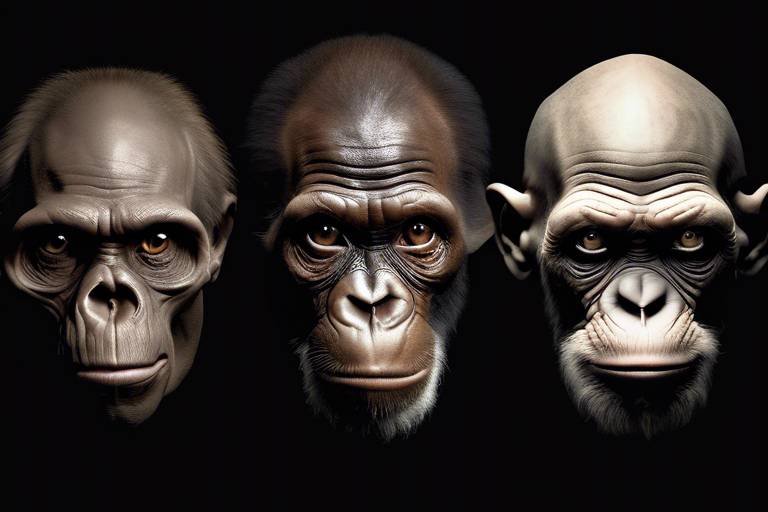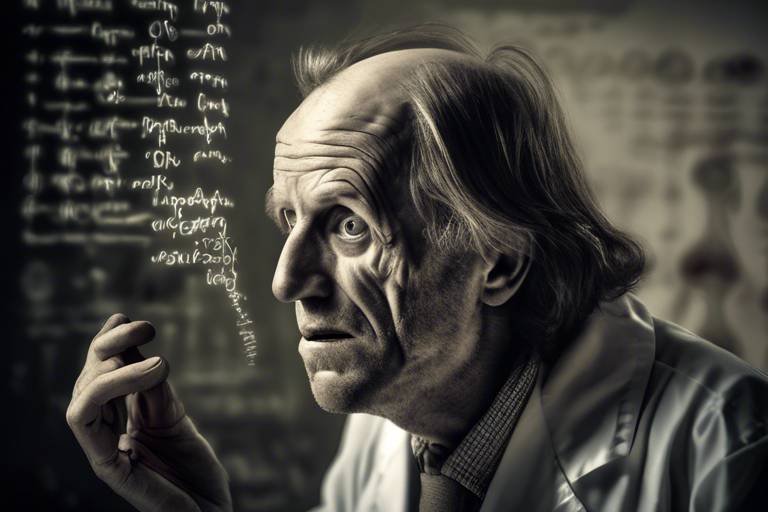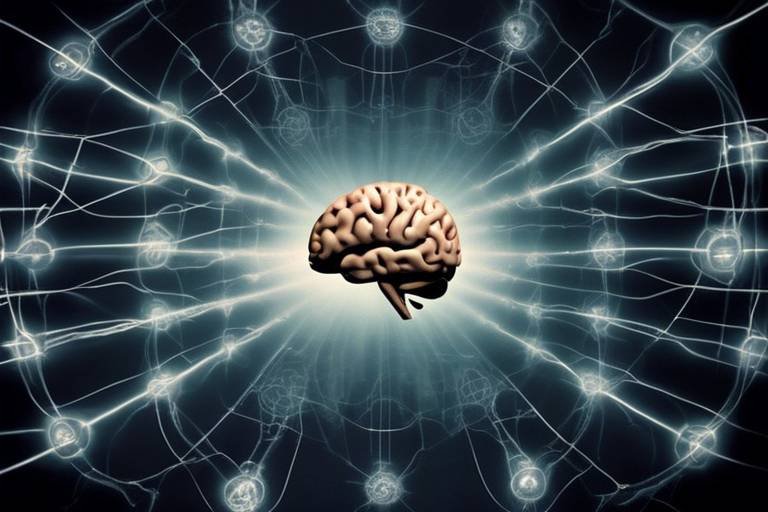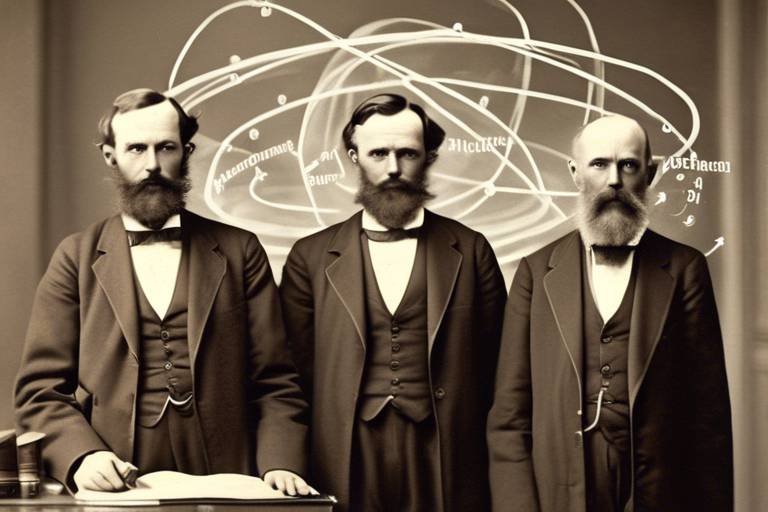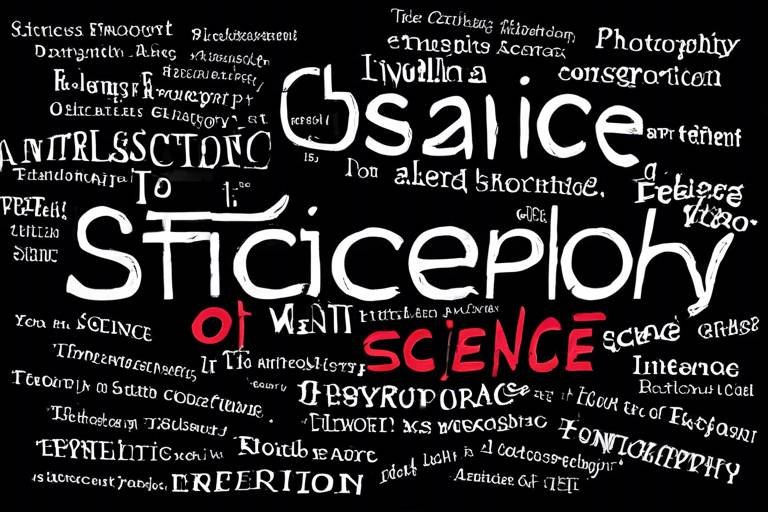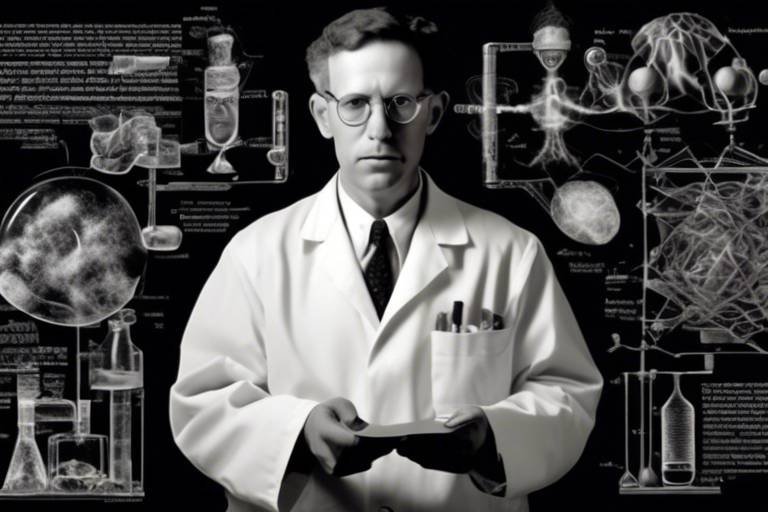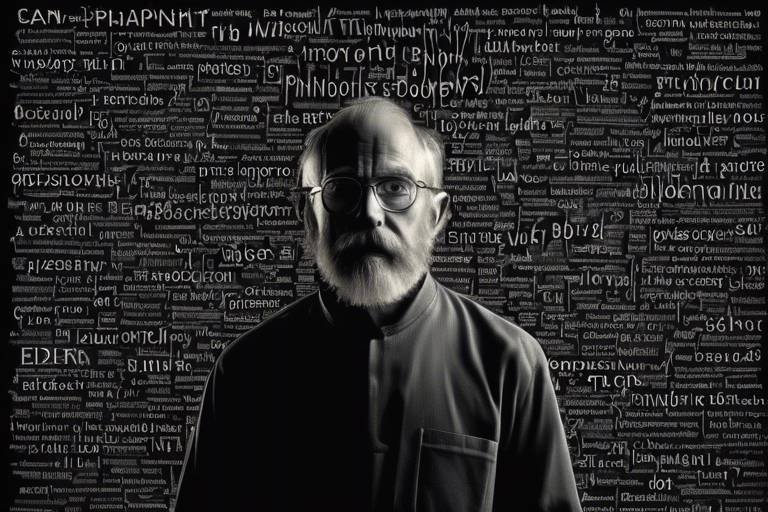The Intersection of Philosophy and Science in Human Evolution
This article explores the complex relationship between philosophical thought and scientific inquiry in understanding human evolution, examining how these fields influence our perspectives on existence, consciousness, and the nature of humanity.
Philosophy provides essential frameworks for interpreting evolutionary theory, addressing questions about purpose, morality, and the implications of human development on our understanding of existence and identity. By contemplating the philosophical aspects of evolution, we can better grasp not just how we came to be, but why it matters. For instance, the question of whether our evolutionary journey has a specific purpose can lead to profound discussions about our responsibilities as conscious beings. Are we merely products of chance, or is there a greater significance to our existence?
This section delves into the scientific principles underpinning human evolution, including genetics, natural selection, and fossil evidence, highlighting how these discoveries shape our understanding of humanity's past. The science of evolution is a tapestry woven from numerous threads of evidence, each contributing to a comprehensive picture of how humans have evolved over millions of years. Understanding these principles is crucial, as they not only inform our knowledge of where we came from but also challenge our perceptions of what it means to be human.
Darwin's theory of evolution by natural selection revolutionized biology and influenced philosophical discourse, prompting debates about determinism, free will, and the ethical implications of evolutionary science. The idea that species evolve through a process of survival of the fittest raises questions about our own place in the natural order. Are our actions predetermined by our biological makeup, or do we possess the ability to transcend our instincts and make conscious choices? This tension between biological determinism and the concept of free will is a rich ground for philosophical exploration.
Critiques of Darwinian evolution have emerged, raising questions about the adequacy of natural selection alone as an explanation for the complexity of life and human consciousness. Some argue that natural selection cannot account for the intricate behaviors and social structures seen in humans and other species. This has led to the exploration of alternative theories, such as punctuated equilibrium and the role of genetic drift. Scientists and philosophers alike are called to reevaluate the mechanisms of evolution and consider a more nuanced understanding of how life evolves.
Recent advancements in genetics and paleontology have expanded our understanding of evolution, necessitating a philosophical reevaluation of what it means to be human in light of new evidence. The discovery of ancient hominid fossils, coupled with breakthroughs in genetic research, has painted a more complex picture of human ancestry. This ongoing dialogue between science and philosophy invites us to reconsider our definitions of humanity and our place in the evolutionary narrative.
The intersection of philosophy and evolution raises profound questions about human nature, ethics, and the future of humanity, prompting discussions on the moral responsibilities that accompany our evolutionary heritage. As we learn more about our biological roots, we must also grapple with the ethical implications of our actions. For example, how should our understanding of evolution inform our approach to issues like genetic engineering and environmental conservation? The answers may not be straightforward, but the conversation is essential.
Exploring the evolution of consciousness involves both scientific and philosophical inquiry, examining how awareness and self-reflection have emerged through evolutionary processes and their implications for understanding the human experience. The evolution of consciousness is a fascinating journey that intertwines biology, psychology, and philosophy. It raises questions about the nature of awareness and the development of complex thought processes that distinguish humans from other species.
The relationship between mind and body remains a central philosophical question in the context of evolution, challenging our understanding of consciousness and its origins within a physical framework. Are our thoughts merely products of brain activity, or is there something more? This age-old question continues to perplex philosophers and scientists alike, as they seek to understand how subjective experiences arise from physical processes.
The ethical considerations arising from evolutionary theory provoke discussions about human behavior, social structures, and moral development, influencing our approach to contemporary issues such as genetic engineering and environmental responsibility. As we delve deeper into our evolutionary past, it is crucial to consider how our understanding of human nature impacts our ethical frameworks. Are our moral instincts a product of evolution, or do they arise from a deeper philosophical understanding of right and wrong?
- What is the relationship between philosophy and science in understanding evolution?
Philosophy provides a framework for interpreting scientific findings, while science offers empirical evidence that can inform philosophical discussions about human existence and morality. - How does Darwin's theory influence modern thought?
Darwin's theory challenges traditional views of humanity's place in the natural world, prompting debates about free will, ethics, and the nature of consciousness. - What are some critiques of Darwinian evolution?
Critiques include the argument that natural selection alone cannot explain the complexity of life and consciousness, leading to alternative theories and a more nuanced understanding of evolution.

The Role of Philosophy in Understanding Evolution
Philosophy plays a crucial role in interpreting and understanding the complexities of evolutionary theory. While science provides the empirical data, philosophy offers the frameworks necessary to address the deeper questions that arise from these findings. For instance, when we consider the implications of evolution on our existence, we inevitably confront questions about purpose and morality. Are we simply products of chance, or is there a greater significance to our evolutionary journey? These inquiries are not just academic; they resonate on a personal level, influencing how we perceive our identity as humans.
Moreover, philosophical inquiry encourages us to examine the ethical implications of our evolutionary heritage. As we learn more about our origins, we must ask ourselves what responsibilities come with this knowledge. For example, if we are products of natural selection, does that justify certain behaviors, or does it compel us to rise above our instincts and strive for a more moral society? The interplay between philosophy and science in this context is not merely a theoretical exercise; it has real-world implications that affect our social structures, laws, and personal relationships.
Furthermore, philosophy helps us to grapple with the existential questions that arise from our understanding of evolution. In a world where we might be seen as mere biological machines, how do we find meaning? This is where the philosophical discourse becomes vital. It allows us to explore concepts such as consciousness, identity, and self-awareness. By examining these themes, we can better understand our place in the universe and what it means to be human.
To illustrate the philosophical frameworks that engage with evolutionary theory, let’s consider a few key themes:
- Determinism vs. Free Will: Are our actions predetermined by our evolutionary history, or do we have the capacity to choose differently?
- Ethical Evolution: How should our understanding of evolution influence our moral decisions, particularly in areas like genetic engineering and environmental stewardship?
- Human Identity: What does it mean to be human in light of our evolutionary past, and how does this shape our future?
Philosophy also invites us to reflect on the narratives we construct about ourselves. The story of human evolution is not just a scientific tale; it is a narrative that shapes our culture, our values, and our understanding of what it means to live a good life. As we continue to explore the intersection of philosophy and science, we must remain open to the profound questions that challenge our perceptions and encourage us to think critically about our existence.

Scientific Foundations of Human Evolution
The scientific study of human evolution is a fascinating journey that intertwines various disciplines, including genetics, paleontology, and anthropology. These fields collectively contribute to our understanding of how humans have evolved over millions of years, shaping not only our physical characteristics but also our behaviors and cultures. At the heart of this exploration lies the concept of natural selection, a mechanism proposed by Charles Darwin that explains how species adapt and evolve in response to environmental pressures.
Genetics plays a pivotal role in unraveling the complexities of evolution. By examining DNA sequences, scientists can trace the lineage of modern humans back to our common ancestors with other primates. The Human Genome Project, for instance, has provided invaluable insights into the genetic variations that distinguish us from our closest relatives. This genetic evidence not only highlights our similarities with other species but also reveals the unique adaptations that have enabled humans to thrive in diverse environments.
Moreover, fossil evidence serves as a crucial piece of the evolutionary puzzle. Fossils provide a tangible record of our ancestors and their physical traits, allowing scientists to reconstruct the evolutionary timeline. For example, the discovery of Australopithecus afarensis, famously known as "Lucy," has shed light on bipedalism and the transition from tree-dwelling to ground-dwelling lifestyles. These findings raise intriguing questions about how environmental changes may have influenced our ancestors' adaptations and behaviors.
To further illustrate the scientific foundations of human evolution, consider the following table that summarizes key discoveries in the field:
| Discovery | Significance | Year |
|---|---|---|
| Lucy (Australopithecus afarensis) | Evidence of bipedalism and early human-like traits | 1974 |
| Neanderthal Genome | Insights into human ancestry and interbreeding | 2010 |
| Homo naledi | Challenges traditional views on the timeline of human evolution | 2015 |
As we delve deeper into the scientific foundations of human evolution, we must also acknowledge the interplay between these discoveries and philosophical inquiry. Each new finding prompts us to reassess our understanding of what it means to be human. Are we merely products of our genetic makeup and environmental influences? Or do we possess an essence that transcends our biological origins? Such questions not only enrich our scientific discourse but also challenge us to explore the ethical implications of our evolutionary journey.
In conclusion, the scientific foundations of human evolution are built upon a rich tapestry of genetic, fossil, and anthropological evidence. Each discovery adds a new layer of complexity to our understanding of humanity, compelling us to reflect on our place in the natural world. As we continue to uncover the mysteries of our past, we are reminded that the story of human evolution is not just a scientific narrative; it is a profound exploration of existence itself.

The Impact of Darwinian Theory
Darwin's theory of evolution by natural selection is not just a cornerstone of biological science; it is a profound intellectual leap that has reshaped our understanding of life itself. Imagine a world where every living organism is seen as a product of a long, intricate dance of survival and adaptation. This theory has ignited a firestorm of philosophical debate, challenging our perceptions of determinism and free will. Are we merely the sum of our genetic parts, or do we possess the agency to shape our destinies? These questions push us to examine the very essence of our humanity.
At its core, Darwinian theory posits that species evolve over time through a process of natural selection, where the fittest individuals survive and reproduce. This principle has not only transformed biology but has also seeped into the realms of philosophy and ethics. For instance, consider the implications of viewing human behavior through an evolutionary lens. If our actions are influenced by survival instincts honed over millennia, what does that say about our moral choices? Are we bound to repeat the patterns of our ancestors, or can we transcend them?
Furthermore, Darwin's ideas have prompted a reevaluation of concepts such as morality and social responsibility. In a world governed by natural selection, how do we define right and wrong? This intersection of biology and ethics raises critical questions about our responsibilities as a species. For example, the rise of genetic engineering and biotechnology brings forth ethical dilemmas that demand a thoughtful response. Should we manipulate our genetic makeup to enhance human capabilities, or does this tread dangerously close to playing God?
To illustrate the profound impact of Darwinian theory, consider the following table that highlights key philosophical questions arising from evolutionary thought:
| Philosophical Question | Implications |
|---|---|
| Are humans inherently good or evil? | Challenges the notion of morality as a fixed concept. |
| What is the nature of consciousness? | Explores whether consciousness is a mere byproduct of evolution. |
| Do we possess free will? | Questions the extent of human agency in decision-making. |
| What are our ethical obligations to other species? | Considers the moral responsibilities stemming from our evolutionary connections. |
As we delve deeper into the implications of Darwinian theory, we find ourselves at a crossroads, where science and philosophy converge to shape our understanding of existence. The debates ignited by Darwin's work continue to resonate in contemporary discussions about human identity and our place in the natural world. By grappling with these questions, we not only honor the legacy of Darwin but also embark on a journey of self-discovery, illuminating the path forward for humanity.
- What is Darwinian theory? - It is the scientific theory that explains how species evolve over time through the process of natural selection.
- How does Darwinian theory impact our understanding of morality? - It challenges traditional views of morality by suggesting that our behaviors may be influenced by evolutionary pressures.
- Can we truly exercise free will if we are products of evolution? - This is a debated topic; some argue that while we are influenced by our biology, we still have the capacity to make choices.
- What ethical dilemmas arise from genetic engineering? - Genetic engineering raises questions about the limits of human intervention in nature and the potential consequences of altering our genetic makeup.

Challenges to Darwinism
While Darwin's theory of evolution by natural selection has profoundly shaped our understanding of biological development, it has not gone unchallenged. Critics argue that natural selection alone cannot adequately explain the intricate complexities of life, particularly when it comes to the emergence of human consciousness. For instance, how do we reconcile the existence of altruism, creativity, and morality with a purely survival-driven narrative? These questions have led to the development of alternative theories and frameworks that seek to address perceived gaps in Darwinian thought.
One significant challenge arises from the field of genetics. The discovery of genetic drift, for example, highlights that random changes in allele frequencies can occur in populations, suggesting that not all evolutionary changes are driven by natural selection. This randomness introduces a layer of complexity that Darwin's initial model did not fully account for. Moreover, epigenetics has shown that environmental factors can influence gene expression, further complicating the simplistic view of hereditary traits passed down through generations.
Additionally, the concept of punctuated equilibrium, proposed by paleontologists Niles Eldredge and Stephen Jay Gould, posits that evolution is characterized by long periods of stability interrupted by sudden bursts of change. This challenges the traditional view of gradual evolution and raises questions about the mechanisms that drive such rapid shifts in species. The fossil record, which often appears to show abrupt transitions, supports this idea and calls for a reevaluation of how we understand evolutionary processes.
Furthermore, the emergence of consciousness presents a unique challenge to Darwinism. How did self-awareness and complex thought evolve if they do not directly contribute to survival? Philosophers and scientists alike grapple with this question, exploring theories that extend beyond natural selection. Some suggest that consciousness may have arisen as a byproduct of other evolutionary advantages, while others propose that it serves a social function, enhancing cooperation among individuals within a species.
In summary, while Darwin's contributions to evolutionary biology are monumental, they have sparked ongoing debates and challenges that push the boundaries of our understanding. The interplay between genetics, paleontology, and the philosophy of mind continues to fuel discussions about the origins of life and consciousness. As we delve deeper into these complexities, it becomes increasingly clear that a multifaceted approach is necessary to fully appreciate the rich tapestry of human evolution.
- What is Darwinism? Darwinism refers to the theory of biological evolution developed by Charles Darwin, emphasizing natural selection as the primary mechanism of evolution.
- What are some critiques of Darwinism? Critics argue that Darwinism does not fully account for genetic drift, punctuated equilibrium, and the emergence of consciousness.
- How does genetics challenge Darwinian evolution? Genetic drift and epigenetics introduce randomness and environmental influences that complicate the traditional view of evolution driven solely by natural selection.
- What is punctuated equilibrium? Punctuated equilibrium is a theory that suggests evolution occurs in rapid bursts rather than gradually over time.
- Why is consciousness a challenge for Darwinism? The origins of consciousness raise questions about its evolutionary advantages and how it fits into the survival narrative.

Integrating New Discoveries
As we delve deeper into the realms of genetics and paleontology, we find ourselves at a fascinating crossroads where traditional evolutionary theories must adapt to accommodate new evidence. The advent of advanced technologies such as DNA sequencing and radiometric dating has revolutionized our understanding of human evolution, leading to discoveries that challenge long-held beliefs about our ancestry. For instance, the sequencing of ancient genomes has unveiled a complex tapestry of interbreeding among various hominin species, such as Neanderthals and Denisovans, which adds layers of complexity to our understanding of what it means to be human.
Moreover, the fossil record has continued to surprise us with remarkable finds that shed light on our evolutionary journey. New fossils, such as those of Australopithecus sediba and Homo naledi, have provided insights that suggest a more intricate evolutionary narrative than previously thought. These discoveries compel us to rethink the linear progression of evolution and acknowledge that it is more of a branching tree than a straight line. Each new find can reshape our understanding of human capabilities, behaviors, and even our cognitive development.
As we integrate these discoveries, we must also confront the philosophical implications they carry. What does it mean for our identity if we share genetic material with species we once considered entirely separate? How does this knowledge shift our perspective on human exceptionalism? These questions are not merely academic; they resonate deeply with our understanding of morality, ethics, and our place in the natural world.
In this context, we can consider the following key points:
- Interbreeding and Genetic Diversity: The realization that modern humans are not a homogenous group but rather a tapestry of genetic contributions from various hominins raises questions about the nature of race and identity.
- Evolutionary Adaptations: Understanding how different environmental pressures shaped our ancestors can inform contemporary discussions on adaptation and survival in a rapidly changing world.
- Ethical Responsibilities: With greater knowledge comes greater responsibility. How we choose to apply our understanding of evolution in areas like genetic engineering and conservation efforts is a pressing ethical concern.
Ultimately, integrating new discoveries into our understanding of human evolution is not just about accumulating knowledge; it’s about transforming how we view ourselves in relation to the universe. As we continue to uncover the mysteries of our past, we must remain vigilant in considering the implications of these findings on our present and future.
- What are some recent discoveries in human evolution? Recent discoveries include ancient fossils and genetic evidence of interbreeding with Neanderthals and Denisovans, which have changed our understanding of human ancestry.
- How does new genetic research impact our understanding of evolution? New genetic research reveals complex relationships between species, suggesting that human evolution is not a linear process but involves branching paths and interbreeding.
- What philosophical questions arise from discoveries in human evolution? Discoveries prompt questions about identity, morality, and our responsibilities as a species, particularly in light of our shared genetic heritage with other hominins.

Philosophical Implications of Evolution
The intersection of philosophy and evolution is a fascinating realm that provokes deep reflection on what it means to be human. As we peel back the layers of evolutionary theory, we encounter profound questions about our nature, purpose, and ethical responsibilities. For instance, if we are products of natural selection, does that imply our actions are predetermined? Or do we still possess free will? These questions challenge us to reconsider our understanding of identity and morality in a world shaped by evolutionary processes.
One of the most intriguing implications of evolution is the concept of moral responsibility. If our behaviors and social structures have evolved over millennia, can we hold individuals accountable for actions that may be rooted in primal instincts? This raises ethical dilemmas surrounding justice and punishment, as we grapple with the balance between innate tendencies and societal expectations. In this light, it becomes essential to explore how our evolutionary past influences contemporary moral frameworks.
Moreover, the evolutionary narrative invites us to reflect on the future of humanity. As we advance in technology and science, particularly in fields like genetic engineering, we must ask ourselves: what ethical boundaries should we establish? The ability to manipulate our genetic makeup could lead to significant advancements, but it also poses risks of exacerbating social inequalities or creating unforeseen consequences. The philosophical discourse surrounding these issues is vital, as it helps us navigate the complexities of our evolving identity.
Additionally, the implications of evolution extend to our understanding of human relationships and community. Evolutionary psychology suggests that many of our social behaviors, such as cooperation and altruism, have roots in survival strategies. This insight can enhance our appreciation of the social bonds we form and the importance of empathy in human interactions. By recognizing these evolutionary underpinnings, we can foster a more compassionate society that values collaboration over competition.
In summary, the philosophical implications of evolution compel us to reflect on our existence and the moral frameworks that guide our actions. As we continue to explore the depths of our evolutionary heritage, we must remain vigilant in addressing the ethical challenges that arise, ensuring that our understanding of humanity evolves alongside our scientific discoveries.
- What are the main philosophical questions raised by evolution?
The main questions include the nature of free will, moral responsibility, and the implications of our evolutionary past on ethics and identity. - How does evolution influence our understanding of morality?
Evolution suggests that many aspects of our moral behavior may have developed as survival strategies, prompting discussions about accountability and societal norms. - What is the significance of consciousness in the context of evolution?
Consciousness plays a crucial role in understanding our self-awareness and decision-making processes, challenging us to consider its origins and implications for human behavior. - How can we address ethical concerns related to genetic engineering?
By engaging in philosophical discourse, we can establish ethical guidelines that prioritize human welfare and societal equity while navigating technological advancements.

Consciousness and the Evolutionary Narrative
Exploring the evolution of consciousness is like peeling back the layers of an onion; each layer reveals a deeper understanding of what it means to be human. At its core, consciousness is not merely a byproduct of evolution but a complex tapestry woven from the threads of biology, experience, and environment. The journey of consciousness is intertwined with our evolutionary history, raising questions that challenge both scientific and philosophical boundaries. How did we transition from simple organisms to beings capable of self-reflection, abstract thought, and moral reasoning? This inquiry invites us to examine not only the biological mechanisms behind consciousness but also the philosophical implications of our awareness.
From a scientific perspective, consciousness can be viewed as an evolutionary advantage. Early humans who developed enhanced awareness were better equipped to navigate their environments, find food, and avoid predators. This survival mechanism laid the groundwork for social interactions and communication, which are critical for the development of complex societies. However, the question remains: Is consciousness merely a tool for survival, or does it serve a greater purpose? This is where philosophy steps in, challenging us to consider the implications of our conscious experience. It prompts profound inquiries about identity, existence, and the very essence of being.
One of the pivotal discussions in this realm is the mind-body problem, which grapples with the relationship between our mental states and physical existence. How do thoughts, feelings, and consciousness emerge from the biochemical processes in our brains? This conundrum has perplexed philosophers and scientists alike, leading to various theories. Some argue for a dualistic perspective, positing that the mind and body are distinct entities, while others advocate for a more integrated view, suggesting that consciousness arises from complex neural networks. Each perspective offers unique insights but also leaves unanswered questions about the nature of consciousness and its evolutionary significance.
Moreover, as we delve deeper into the evolutionary narrative, we must consider the ethical implications that accompany our understanding of consciousness. If we accept that consciousness has evolved, what responsibilities do we hold towards other sentient beings? This inquiry is particularly relevant in light of contemporary issues such as genetic engineering and environmental sustainability. As we gain the ability to manipulate life at a genetic level, we must reflect on the moral responsibilities that arise from our evolutionary heritage. Are we stewards of our planet, or do we risk becoming its architects of destruction?
To further illustrate the interplay between consciousness and evolution, we can look at a few key milestones in the development of human awareness:
| Milestone | Description | Implications |
|---|---|---|
| Language Development | The emergence of complex language systems allowed for advanced communication. | Facilitated social bonding, cultural evolution, and shared knowledge. |
| Abstract Thinking | The ability to think beyond immediate experiences and consider hypothetical scenarios. | Enabled planning, problem-solving, and ethical reasoning. |
| Self-Reflection | The capacity to introspect and evaluate one's thoughts and actions. | Led to a deeper understanding of identity and moral responsibility. |
In conclusion, the exploration of consciousness within the evolutionary narrative not only enriches our understanding of human development but also challenges us to consider our role in the broader tapestry of life. As we reflect on our consciousness, we must ask ourselves: What does it mean to be human? This question is not just a philosophical musing; it is a call to action, urging us to embrace our responsibilities as conscious beings navigating an ever-evolving world.
- What is consciousness? Consciousness refers to the state of being aware of and able to think about one's own existence, thoughts, and surroundings.
- How did consciousness evolve? Consciousness likely evolved as a survival mechanism, allowing early humans to navigate their environments more effectively and form complex social structures.
- What is the mind-body problem? The mind-body problem explores the relationship between mental states (thoughts, feelings) and physical states (brain activity), questioning how they interact and influence one another.
- What ethical implications arise from our understanding of consciousness? Understanding consciousness raises questions about our responsibilities towards other sentient beings and the ethical considerations in areas like genetic engineering and environmental stewardship.

The Mind-Body Problem
The mind-body problem is a philosophical conundrum that has perplexed thinkers for centuries, and it holds a particularly intriguing place within the context of human evolution. At its core, this problem grapples with the relationship between our mental states—thoughts, feelings, consciousness—and our physical existence, namely the body. How can something as intangible as thought arise from the physical processes of the brain? This question not only challenges our understanding of consciousness but also prompts us to reconsider the very essence of what it means to be human.
To illustrate, consider the analogy of a computer. Just like a computer runs software to perform tasks, our brain processes information, leading to thoughts and emotions. But what happens when the software malfunctions? The computer may still function physically, but the output becomes erratic or nonsensical. Similarly, if our brain is physically intact yet our consciousness is impaired, what does that say about the relationship between mind and body? This analogy sheds light on the complexities of the mind-body interaction, suggesting that while they are distinct, they are also deeply intertwined.
Philosophers have proposed various theories to explain this relationship, including:
- Dualism: This theory, famously advocated by René Descartes, posits that the mind and body are separate entities. The mind is non-physical and interacts with the physical body, leading to the question of how this interaction occurs.
- Physicalism: This viewpoint argues that everything about the mind can be explained in terms of physical processes. According to this perspective, consciousness is merely a byproduct of brain activity.
- Functionalism: This theory suggests that mental states are defined by their functional roles rather than their physical substance. In other words, what matters is not what the mind is made of, but what it does.
These theories highlight the diversity of thought surrounding the mind-body problem, yet they also raise further questions. For instance, if consciousness is merely a byproduct of physical processes, does that diminish the significance of our thoughts and emotions? Are we simply biological machines, or is there something inherently unique about the human experience? Such questions lead us to ponder the implications of our evolutionary journey. As we evolved, did our capacity for self-reflection and complex thought emerge as a survival mechanism, or is it an incidental byproduct of our biological development?
Moreover, the mind-body problem has profound implications for our understanding of ethics and morality. If our thoughts and actions are merely the result of physical processes, can we hold individuals morally accountable for their actions? This question becomes particularly relevant in discussions surrounding mental health, addiction, and criminal behavior. Are these individuals merely products of their biological makeup, or do they possess the agency to make choices? As we delve deeper into the evolutionary narrative of consciousness, we must grapple with such ethical dilemmas that challenge our traditional notions of free will and responsibility.
In conclusion, the mind-body problem is not just an abstract philosophical question; it is a pivotal issue that influences our understanding of human nature and our place in the evolutionary narrative. By exploring this intersection of philosophy and science, we gain insights into the complexities of consciousness, the nature of existence, and the ethical responsibilities that accompany our evolutionary heritage.
- What is the mind-body problem? The mind-body problem refers to the philosophical debate concerning the relationship between mental states and physical processes, particularly how consciousness arises from the brain.
- Why is the mind-body problem significant in the study of evolution? It challenges our understanding of human consciousness, agency, and moral responsibility, prompting us to reconsider what it means to be human in light of our evolutionary history.
- How do different philosophical theories address the mind-body problem? Theories such as dualism, physicalism, and functionalism offer varying perspectives on the relationship between mind and body, each with its own implications for understanding consciousness.
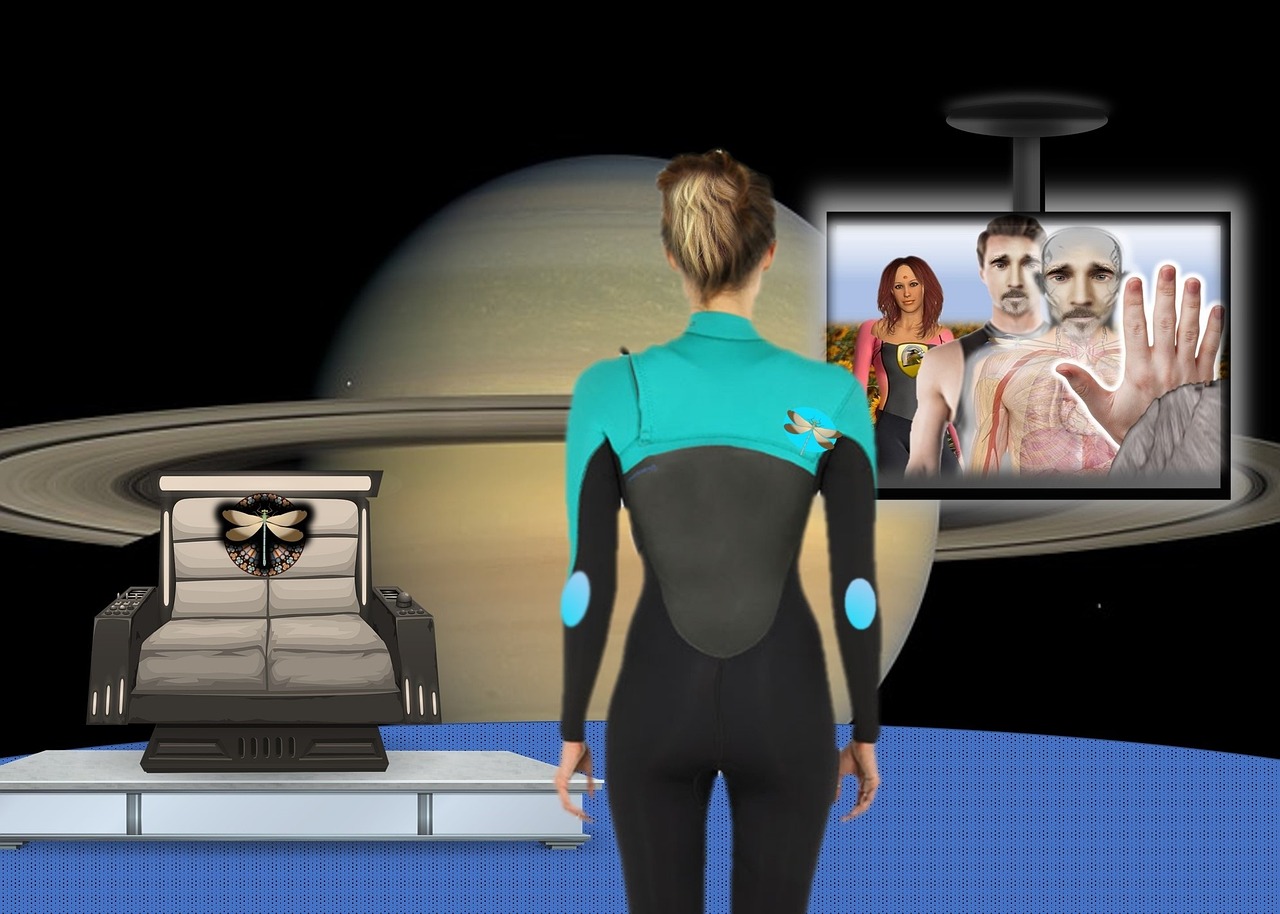
Ethics in Evolutionary Context
When we dive into the murky waters of evolutionary ethics, we find ourselves grappling with some of the most profound questions about what it means to be human. As we explore our evolutionary roots, we can't help but wonder: how does our understanding of evolution shape our moral compass? The interplay between our biological heritage and our ethical frameworks is not just a philosophical exercise; it has real-world implications that affect our decisions and behaviors today.
At the heart of this discussion is the idea that our evolutionary past informs our present-day ethics. For instance, behaviors such as altruism and cooperation, which are often seen as hallmarks of humanity, can be traced back to our evolutionary ancestors. These traits may have provided survival advantages, fostering group cohesion and enhancing reproductive success. But does that mean our moral decisions are merely products of evolutionary processes? Or do we possess a deeper sense of morality that transcends our biological instincts?
Moreover, as we stand on the brink of technological advancements that challenge our ethical boundaries—such as genetic engineering, cloning, and artificial intelligence—we must consider the implications of our evolutionary narrative. Questions such as "What responsibilities do we have towards other species?" and "How should we treat the environment?" take on new urgency. The ethical dilemmas we face today are not just about right or wrong; they are about understanding our place in the interconnected web of life.
To illustrate this point, consider the following table that summarizes key ethical considerations arising from evolutionary theory:
| Ethical Consideration | Evolutionary Perspective |
|---|---|
| Altruism | Rooted in survival benefits for the group and gene propagation. |
| Environmental Responsibility | Understanding our impact on ecosystems as part of our evolutionary legacy. |
| Genetic Engineering | Ethical implications of altering human evolution and potential unforeseen consequences. |
| Animal Rights | Recognizing the shared evolutionary history and the moral obligations it entails. |
As we navigate these ethical waters, it becomes clear that understanding our evolutionary context is essential for making informed decisions. It challenges us to reflect on our values and the kind of future we wish to create. Are we simply products of our biology, or do we have the capacity for moral agency that allows us to rise above our instincts? This ongoing dialogue between ethics and evolution is crucial as we forge ahead into an uncertain future.
In conclusion, the ethics of evolution is not just a theoretical discussion; it’s a call to action. We must harness our understanding of our evolutionary past to inform our present choices and future directions. The questions we ask today will shape the world of tomorrow, and it is our responsibility to ensure that our ethical frameworks evolve alongside our scientific understanding.
- What is evolutionary ethics? Evolutionary ethics examines how our understanding of evolution influences our moral beliefs and behaviors.
- How does evolution affect our moral decisions? Our evolutionary background can shape our instincts toward cooperation and altruism, informing our ethical frameworks.
- What are some ethical dilemmas related to genetic engineering? Genetic engineering raises questions about the potential impacts on human evolution, societal inequalities, and the moral status of altered beings.
- Why is environmental responsibility important in the context of evolution? Recognizing our interconnectedness with other species and ecosystems can guide us in making ethical choices that promote sustainability.
Frequently Asked Questions
- What is the relationship between philosophy and science in understanding human evolution?
The relationship is intricate and dynamic. Philosophy provides frameworks to interpret scientific theories, particularly in addressing questions about existence, morality, and identity. Science, on the other hand, offers empirical evidence and theories, such as Darwinian evolution, which challenge and enrich philosophical discourse.
- How does Darwin's theory of evolution influence philosophical thought?
Darwin's theory revolutionized biology and sparked debates in philosophy regarding determinism, free will, and ethics. It compels us to reconsider our place in the natural world and challenges traditional notions of purpose and moral responsibility, prompting deeper inquiries into what it means to be human.
- What are some criticisms of Darwinian evolution?
Critiques often focus on the adequacy of natural selection as the sole explanation for the complexity of life. Some argue that it doesn't account for the intricacies of consciousness and social behavior, leading to discussions about alternative explanations or additional factors that may influence evolution.
- How do recent discoveries in genetics and paleontology affect our understanding of evolution?
Recent advancements have revealed complexities in genetic variation and fossil records that challenge previous models of human evolution. These discoveries necessitate a reevaluation of philosophical perspectives on what it means to be human, as they provide new insights into our origins and development.
- What ethical implications arise from evolutionary theory?
Evolutionary theory raises important ethical questions about human behavior, social structures, and moral development. It influences contemporary issues such as genetic engineering and environmental responsibility, prompting us to consider our moral obligations in light of our evolutionary heritage.
- How does consciousness relate to human evolution?
The evolution of consciousness is a pivotal topic that intertwines scientific and philosophical inquiry. Understanding how self-awareness and reflective thought have emerged through evolutionary processes can provide deeper insights into the human experience and our understanding of what it means to be conscious.
- What is the mind-body problem in the context of evolution?
The mind-body problem questions how consciousness arises from physical processes in the brain. In evolutionary terms, this dilemma challenges our understanding of how mental states relate to physical states, and whether consciousness can be fully explained through biological evolution alone.

